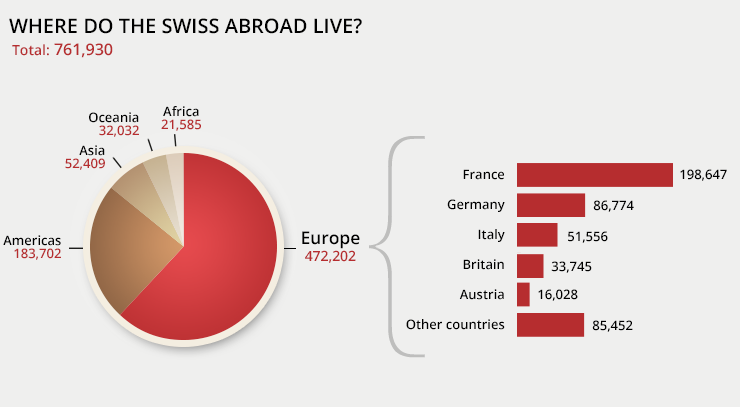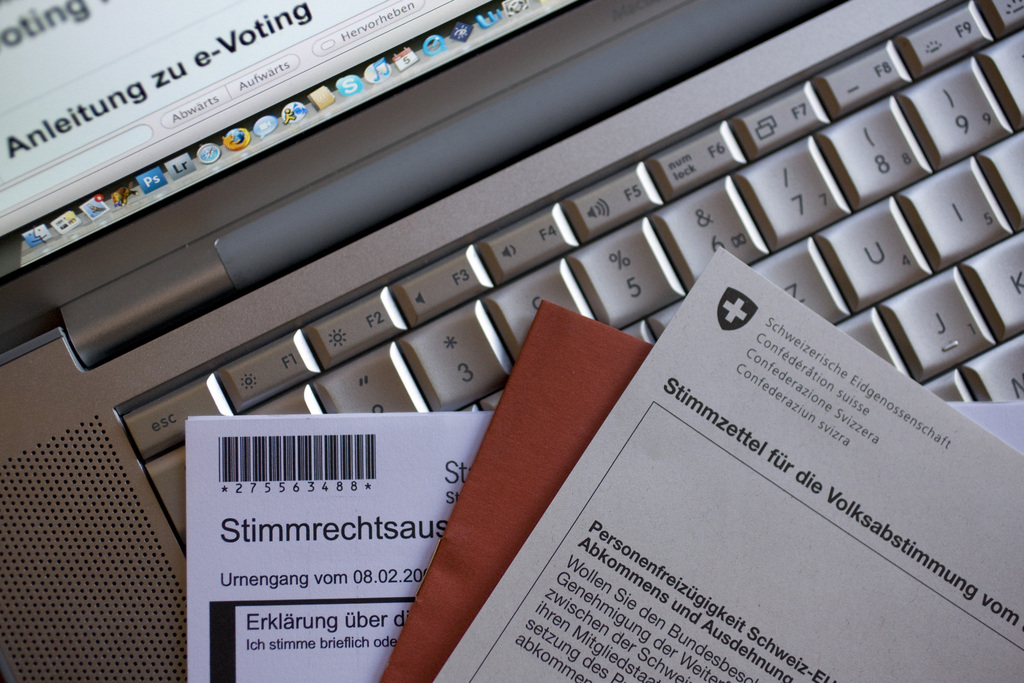Direct democracy enters new phase of digital era

The government plans to introduce e-voting for all Swiss citizens and will give its expatriates across the world a pioneering role. However, security aspects have prompted concerns about extending the digital tool globally.
After more than ten years’ experience of online voting in more than 100 ballots, the cabinet seems confident e-voting is the answer to the expectations of a young electorate.
In a report published in June, the government declared that the introduction of e-voting was the logical consequence of developments in society and in the communications sector over recent decades.
Based on the results of trials in 13 of Switzerland’s 26 cantons which have been taking part in the tests, the cabinet has decided to gradually extend e-voting. Special emphasis is to be given to security issues, without applying any undue time pressure, while respecting the autonomy of the cantons and the principle of voluntariness, according to the report.
Switzerland is a one of the leading country’s for e-voting. Elsewhere, the Baltic republic of Estonia is the only nation to have introduced the system permanently for parliamentary elections.
The Swiss expatriate community will remain at the forefront of efforts to further develop the tool. The aim is to let Swiss citizens abroad use e-voting for the next parliamentary elections in October 2015.
The international agreement regulating exports of dual-use goods and technology is a multilateral export control regime.
Established in 1996, it sets the basis for the transfer of confidential coded data necessary for the introduction of e-voting outside a country’s borders.
Currently 41 countries states are participating in the arrangement, mostly countries in Europe and North America, as well as Australia, Argentina, Japan, South Africa, South Korea and New Zealand.
Expat priority
The government therefore urged cantons to set the same target. It also decided to do away with restrictions excluding Swiss expats in certain countries which have not signed up to the Wassenaar Arrangement, which regulates the transfer of coded date. (See infobox)
These moves are in line with a petition launched by the Organisation of the Swiss Abroad (OSA).
“We welcome both steps. Our aim is of course to grant all Swiss expatriates the same possibilities. We also hope that the process be speeded up. Therefore, we are trying to convince those cantons which have not yet tried e-voting to join the trials,” said Sarah Mastantuoni, legal adviser for OSA.
As of next year at least three additional cantons – Uri, Obwalden and Valais – will offer e-voting for their Swiss citizens who live abroad. They will use an electronic system developed by canton Geneva.
“We are currently considering the next steps together with the three cantons,” confirmed Christophe Genoud, Geneva’s vice-chancellor.
Discussions are also underway with other cantons which might join the Geneva system. However, Genoud declined to further details as negotiations are ongoing.
Several other cantons have expressed an interest in using a digital platform developed by canton Zurich, according to Stefan Langenauer from the cantonal statistics office.
Some of them hope to use the system for local elections.
Zurich, Switzerland’s most populated canton, will resume e-voting trials next year following a temporary adjournment of in 2011.
The first e-voting tests were launched during the 2003 local votes in canton Geneva.
Two years later trials were also carried out in cantons Zurich and Neuchâtel.
All three pioneering cantons used their own information technology systems. Both Zurich and Geneva cooperated with other cantons wishing to use their IT platforms.
Over the years the list of cantons taking part in e-vote tests has increased and now includes 13 out of 26 cantons.
Cantons Basel City, Bern and Lucerne signed up to the Geneva platform, while cantons Fribourg, Graubünden, Solothurn, Schaffhausen, St Gallen, Aargau and Thurgau use a copy of the system developed by Zurich.
Aargau, Basel City, Graubünden and St Gallen were the first to authorise e-voting for the last parliamentary elections in 2011.
In the same year Zurich suspended its tests, but it will resume them in 2014.
Geneva and Neuchâtel for their part extended the use of e-voting to citizens resident in their cantons; elsewhere only Swiss expatriates, registered in a certain canton, can apply.
About 90,000 citizens in Switzerland were allowed to vote electronically in 2012. At the same time about 65,000 Swiss expats were included in e-vote trials.
Virus
However, political opposition against the technology has been growing in several cantons, notably from the centre-left Greens and the rightwing Swiss People’s Party in Zurich and Geneva.
At the origin of the latest controversy are newspaper reports from July about an IT expert who created a virus that could be introduced into a private computer used by a citizen from Geneva.
The virus changed the vote without letting the citizen know about it or asking for his approval.
Federal officials did not express their surprise at the news.
“All sides involved have been aware of the risks from the beginning of the e-vote trials more than ten years ago,” said Thomas Abegglen from the Federal Chancellery.
“There are only isolated cases. Experts found it is a calculated risk and the possible damages are limited. That is why quotas were set for citizens allowed to take part in e-voting. They help ensure that abuses of the system cannot invalidate an entire vote.”
In its report the government acknowledged the risks and dangers involved in ballots over the internet, but said in general they were at “tolerable” levels.
Nevertheless, the authorities said further security measures will be needed as the e-vote system is extended.

More
Swiss citizens live in all corners of the world
Verification
Under current rules, up to 30 per cent of the electorate in an individual canton can take part in e-vote trials. The quota will remain unchanged as long as the cantons continue to use the same IT system.
Those cantons wishing to grant all eligible citizens the right to use e-voting must install a new generation of the electronic system. This will permit the verification of a vote without compromising the ballot secrecy rules.
Given the considerable costs and other additional difficulties linked to improving security, the cantonal authorities can initially apply a system with lower standards for verification in line with agreed security criteria.
In a first phase this will pave the way for an increase in the participation quota to 50 per cent of the electorate able to use e-voting.
These options should make it possible for individual cantons to proceed at their own pace, without being subject to any special conditions, outside pressure or other obstacles.
(Adapted from Italian by Urs Geiser)

In compliance with the JTI standards
More: SWI swissinfo.ch certified by the Journalism Trust Initiative



You can find an overview of ongoing debates with our journalists here . Please join us!
If you want to start a conversation about a topic raised in this article or want to report factual errors, email us at english@swissinfo.ch.